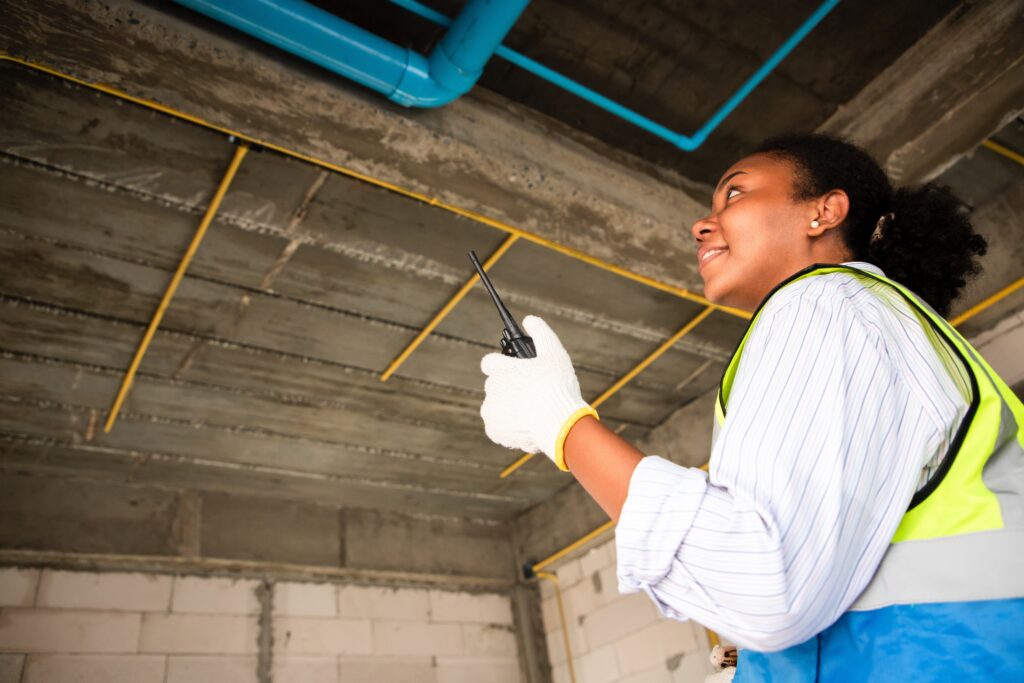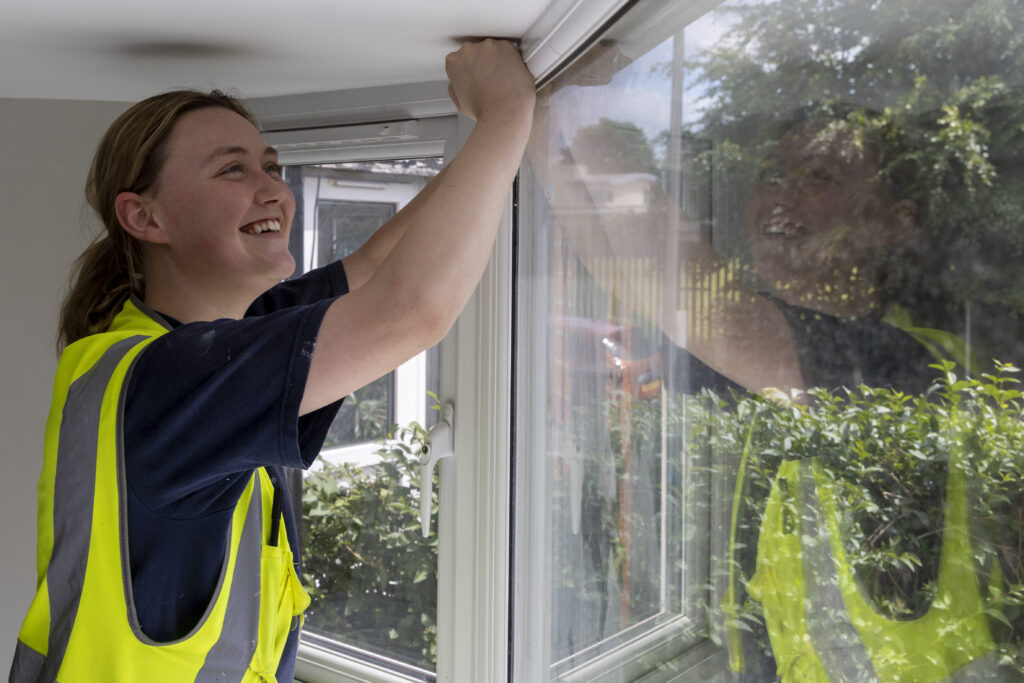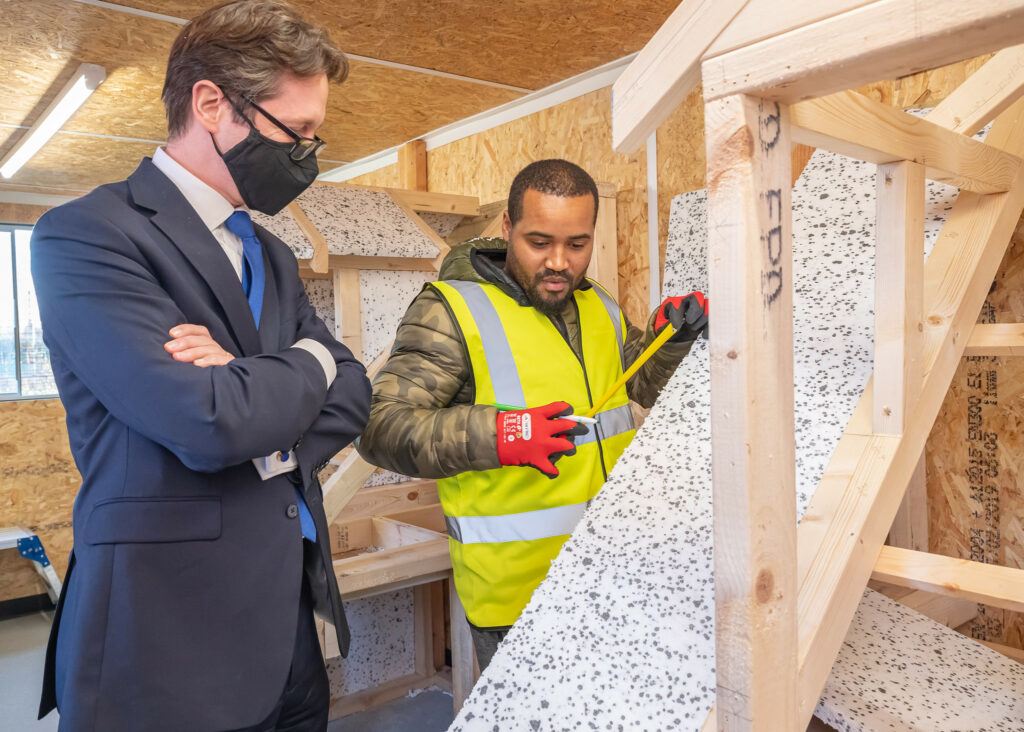We will not be able to tackle the energy crisis and climate emergency without decarbonising our homes at scale – starting now. To do this we need a retrofit skills revolution.
Thousands of people need to be trained in retrofitting techniques such as installing high quality wall, floor and roof insulation and installing smart renewable energy systems. Yet, at present, there is no detailed national skills plan to make our homes fit for the future. Current forecasts show that we will fall far short of training the estimated 400,000 retrofit professionals required to achieve this.
Ashden believes that a local, place-based approach should be at the heart of retrofit skills development, but this can only be achieved with supportive national policy. This briefing highlights actions for local and national government to help achieve the target of retrofitting over 19 million homes by 2035. It draws on practical examples from Ashden’s UK work to accelerate transformative climate solutions.
These include Portsmouth City Council’s ambitious partnership to create a NetZero Training Hub and the work of B4Box and Stockport Homes Group in an area badly affected by fuel poverty, to make homes more energy efficient, create multi-skilled green jobs and improve living conditions.
Conclusions from the briefing show that it is essential that councils set out long term retrofit plans to instil confidence within local supply chains and education providers of the future jobs that retrofit will guarantee in the coming years. Existing government funded schemes, such as the Social Housing Decarbonisation Fund, provide an initial pipeline of work but represent less than 5% of the funding needed to decarbonise social housing. Much more policy certainty from national government is needed, including financial incentives, regulation, public engagement and a major programme of investment.
In the short-term councils should develop and publish evidence setting out the local skills gap and opportunities for retrofit jobs and should identify quick wins such as training councils’ home improvement agency and handyperson teams so that they can improve homes this winter.
Councils must also forge partnerships with their local colleges – who train over 160,000 construction workers each year and the briefing case studies provide practical examples of how local government is working in partnership with the FE sector, which could provide a template for a co-ordinated national roll out. Construction apprenticeships need to be overhauled to cover retrofit skills, and not just new build, and to be more flexible so that it is easier for small and micro-businesses to take on apprentices.
Communities and grassroots organisations also have a role to play in supporting initiatives and inspiring young people to pursue career paths in green construction.
If action is taken now an innovative retrofit skills revolution will enable a rapid scale up of energy efficiency work – a triple win – boosting local economies and jobs, tackling the climate emergency and cutting energy bills.
The poor state of UK homes is a major factor in the country’s energy crisis. Cold, draughty properties heighten the impact of rocketing fuel prices – and the UK has the worst insulated housing stock in Western Europe.
Action to upgrade (or ‘retrofit’) these homes is needed now more than ever – both to reduce carbon emissions and to protect the public, particularly people in fragile health and those on low incomes.
A national retrofit strategy to retrofit over 19 million homes by 2035 would create wide-ranging benefits: creating jobs in every part of the country and saving residents thousands on energy bills in the years to come.
It is estimated that over 400,000 builders and skilled retrofit professionals are needed, but just 200,000 people currently work on maintaining and upgrading existing homes. There are currently under 1,000 retrofit co-ordinators – people trained to oversee the management and design of all retrofit measures – but forecasts suggests that 50,000 may be needed by 2030. Just 3,000 heating engineers are trained to install heat pumps, less than 5% of the total plumbing and heating workforce.
This briefing sets out how central and local government can create high quality training opportunities that overcome the current lack of skilled installers.
It draws on insights from Ashden’s award process – a rigorous annual search for pioneering climate innovation – as well as over 40 case studies of council climate action prepared with Friends of the Earth. It is also informed by the experiences and views of councils in Ashden’s regional local authority learning networks, and its partnerships the UK Green Building Council, London South Bank University and Nationwide Building Society and others.
This briefing shows policy makers immediate and long-term actions that can spark a retrofit skills revolution, with clear examples of proven innovation. It offers solutions, backed up by case studies of local authorities and others boosting green skills training and strengthening local supply chains to deliver retrofit programmes.
Action on retrofit skills delivers a ‘triple win’ – decent, well-paid jobs in communities across the country, high quality retrofits that protect people from high energy bills, and rapid decarbonisation.
Conversely, the risks of inaction are incredibly costly. Carbon emissions will stay high, and the government may face an open-ended commitment to support energy companies. And a key opportunity to create jobs and improve livelihoods in all areas of the UK will be squandered.
The following case studies and recommendations show solutions to the retrofit skills challenge do exist. The UK government must act now to support local government, education providers and employers to deliver a green skills revolution.

Portsmouth City Council has ambitious plans to retrofit its housing stock, but lack the skilled local supply chain to improve the fabric of homes and deliver heat pump installations. To overcome this, the council has supported the City of Portsmouth College in the creation of the NetZero Training Hub.
This will equip local people with the skills to work in the green economy across four areas. These are fabric (insulation and ventilation), heat (heat pumps and heat batteries), power (solar energy and battery storage) and electric vehicles (maintenance and charger installation).
Retrofit training at the hub will be linked to a pilot project delivering whole-house retrofit to up to 30 charity-owned homes. This pilot will create direct employment for graduates at the Hub, with the plan that this newly developed capability is used on both social and private homes.
Portsmouth City Council’s investment in retrofit skills training, and leadership on skills development demonstrates its long-term ambition around retrofit to local SMEs – which encourages them to upskill their staff. This is crucial to developing a resilient local supply chain that is ready to deliver retrofit.
The hub aims to bring a wide variety of groups into the green economy. It will deliver entry-level courses for local people not in employment, education or training (NEETs), as well as construction apprenticeships with additional retrofit components. Courses will also accredit builders currently in the trade to PAS2035 standard – the benchmark for domestic retrofit work in the UK.
The council is using existing partnerships with local job centres and community groups that work closely with NEETs to take on new learners at the hub.
Engagement with schools is also part of the council’s long-term plan. The authority is working with curriculum leaders to support the inclusion of green skills on curriculums, and talking to final year primary pupils on careers in the green economy.

B4Box is a construction training provider in Stockport, with a focus on social value. The social enterprise carries out work to bring unoccupied homes back into use, through a close relationship with housing association Stockport Homes Group. The contract between the B4Box and Stockport Homes Group casts the two as partners, rather than client and construction provider.
Through an innovative social value procurement contract, Stockport Homes Group is buying local skills training and employment from B4Box, in a construction work setting. This flips the typical process of purchasing construction work with skills training and social value as additional elements. This approach gives B4Box with a secure pipeline of work that allows it to deliver a varied set of onsite training services.
B4Box’s integrated model allows it to deliver up to 90% of a whole-house retrofit project with only two staff and one or two apprentices, cutting costs and time significantly compared to other approaches.
B4Box delivers training through multi-trade skills apprenticeships that build hands-on knowledge in areas such as joinery, plastering, tiling and roofing. Training at B4Box functions as an on-site college, where apprentices gaining multi-trade qualifications learn how to deliver the varied requirements of a whole-house retrofit in actual homes. This equips them with retrofit expertise, while local homes are become better insulated against the cold.
B4Box will only train up people that live within five miles of one of their construction sites, ensuring that they deliver targeted benefits to communities. Through creating partnerships within the community, such as through local schools, employment services and probation services, B4Box attracts trainees from backgrounds that commonly face barriers to employment.
B4Box learners become part of the company’s full-time workforce, with more than 85% of B4Box’s employed full-time workforce coming from disadvantaged backgrounds including ex-offenders, care leavers, and those far removed from the job market.

The Low Carbon Academy’s Retrofit Skills Hub is upskilling construction workers with a range of free courses. The initiative has been commissioned by the Greater Manchester Combined Authority and is delivered in partnership with Manchester College, Oldham College, The Retrofit Academy and carbon literacy trainer Fabric CIC.
The hub launched in September 2021 and aims to train more than 1,000 people by 2023, with 400 participating so far. Courses are offered online and face to face, and have been developed with employers to make sure the skills taught match the demands of the industry.
The initiative is also upskilling local tutors through the ‘Train the trainer’ programme, where college tutors review their current apprenticeship offerings with Low Carbon Academy and work together to identify areas for adding additional training. This builds retrofit skillsets across multiple pre-existing qualifications – offering a critical reflection and clear direction for how a college can rapidly enhance its retrofit offering.
Uniquely, GMCA’s procurement process for this programme allows training to be adapted throughout delivery, meaning the upskilling on offer can meet the needs of local SMEs.
By getting involved in such a wide-ranging partnership, housing providers can help secure a pipeline of skills in their area – but also ensure strategic developments around retrofit take their needs into account.

Working in partnership with local authorities across the UK, The Retrofit Academy (TRA) is helping to facilitate the upskilling required to reach the targeted decarbonisation of UK housing stock to ensure warm, healthy, sustainable homes. With more than a decade of experience in retrofit, TRA provides in-depth advice and support for local authorities, social housing providers and major retrofit employers on all aspects of delivering their retrofit targets.
Through the UK Government Funded Community Renewal Fund (CRF), TRA has been working with several local authorities, including Devon County Council and Essex County Council, to deliver programmes designed to kick-start the development of a competent retrofit workforce in each county. These programmes include conducting an analysis of each area’s housing stock, carrying out in-depth supply chain research to understand the “as-is” picture of retrofit skills, upskilling housing providers in retrofit and supporting SMEs to enter the retrofit sector, as well as large-scale funded training provision. Through CRF programmes in Devon and Essex, TRA has delivered courses to over 400 learners.
TRA has also been working with training providers in Devon and Essex to establish their first franchised training partners, to ensure that retrofit training can be delivered locally in the future. The aim is to leave a legacy in each region by teaching local trainers who can, in turn, train a local retrofit workforce able to deliver safe, high quality retrofit projects.
Train up home improvement agency and handyperson teams
As an immediate first step, councils should ensure that home improvement agency staff and handyperson teams are able to install simple energy efficiency measures such as draughtproofing and topping up loft insulation. Many councils, including Epsom and Ewell and Oxfordshire, are offering basic energy efficiency measures to older residents.
Develop and publish an evidence base setting out local opportunities for skills development
Working with employers and local colleges, determine current retrofit capacity, where the skills gaps are and is the level of local training provision.
Partner with grassroots organisations. Grassroots groups can play a key role in supporting local authorities on retrofit, as a trusted presence helping councils reach local communities, including diverse groups.
Local government action on retrofit skills can only succeed with supportive national policy, and the UK government must make retrofit and low carbon heat top priorities for its new Green Jobs Delivery Group. The government has made a start with the time-limited Home Decarbonisation Skills Training Competition announced in September 2022, but so far policy initiatives have been piecemeal. New ministers responsible for energy, levelling up and education must work together to deliver joined up action on retrofit skills development.
Long term policy commitment
Councils, education providers, and installers need long-term policy certainty on retrofit – too many stop-start government schemes have undermined investment in training. The UK needs a national retrofit strategy with financial incentives, regulation, public engagement and a major programme of investment – see our recent retrofit briefing for more details.
A detailed national skills plan for retrofit
Retrofitting our homes offers a unique opportunity to create employment in every region of the country. Ashden supports the call by the Construction Industry Training Board and others for a national retrofit training programme at the scale needed to upgrade 27 million homes. Such a programme would:
Restoration of the Adult Education Budget to 2010 levels
Ashden supports the Local Government Association’s calls for the Adult Education Budget to be restored to its 2010 levels as a minimum. This should be fully devolved to local authorities and mayoral combined authorities to target and deliver short courses, enabling people to pivot into retrofit roles.
Integrate skills development into government-funded retrofit schemes
The government has been funding delivery of energy efficiency schemes by local authorities since Autumn 2020. However, government skills development initiatives such as the Green Homes Grant Skills Training Competition have been small-scale and are not linked to local authority programme delivery. To improve skills development, government should:
Reform apprenticeships
Construction apprenticeships have been largely shaped by new build projects. To deliver the right skills for retrofit, apprenticeship standards must be overhauled, and it should be easier for small and micro-businesses to take on apprentices.
The Institute for Apprenticeships and Technical Education has started this work, guided by its new Green Apprenticeships Advisory Panel, but rapid progress is needed. The institute must actively engage both with Tier 1 contractors delivering public sector-led retrofit, and smaller general builders who service non-fuel poor households.
In relation to apprenticeship standards, government should:
To make it easier for SMEs to take on apprentices, government should:
Support education providers
Colleges enroll 160,000 construction workers each year, and will play a key role in the provision of skills needed to decarbonise our buildings. But there has been an underinvestment in both facilities and teaching staff over many years. The Skills and Post-16 Education Act (2022) is a good start, but fails to provide the funding needed to really ramp up construction training. Central government should:
The challenge of decarbonising homes can seem overwhelming – but examples of proven, practical innovation show that Government and local authorities can accelerate action in this crucial area.
For councils, partnerships and collaboration with central government, community groups and other local authorities can have a huge impact on local carbon emissions and the lives of residents.
T: 0207 4100330 E: info@ashden.org
The Peak, 3rd Floor 5 Wilton Road, London, SW1V 1AP
Registered in England and Wales as a company limited by guarantee.
Registered number: 05062574/ Charity number: 1104153
See our privacy policy.
This site uses cookies to provide you with the best user experience. By using the Ashden website, you accept our use of cookies.
Stay up to date